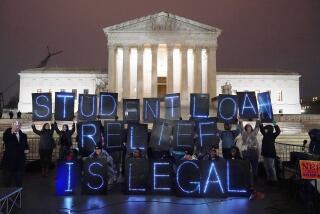Judge Backs Florida Ban on Adoptions by Homosexuals
A federal judge upheld a Florida law banning gays and lesbians from adopting children, ruling Thursday that there is no proof that homosexuals are able to provide a stable family environment.
The decision by U.S. District Judge Lawrence King left intact America’s toughest legal prohibition against adoptions by homosexuals and ignited a firestorm of criticism.
“It’s profoundly unfortunate for the children of Florida who need stable and loving homes,” said Lisa Bennett, who runs FamilyNet, a Web site dedicated to gay family issues. “We can’t look at the diversity of family forms coming out now and think that there is only one right way to raise a child.”
“I’m greatly saddened,” said Howard Simon, director of the Florida branch of the American Civil Liberties Union here. “It took 50 years to reverse legalized racial discrimination in this country. I hope it won’t take 50 years to reverse legalized discrimination against gay people.”
Conservative groups, however, hailed the judge as having upheld the age-old paradigm of the family.
“It takes one father and one mother, and the chemistry that the male and female create, to raise a child,” said the Rev. Lou Sheldon, a Presbyterian minister from Anaheim who founded the Traditional Values Coalition, which has a membership of more than 43,000 Protestant churches. “It’s hard enough for a single parent, not to mention same-sex adults.”
The judge’s ruling came in a lawsuit brought by four Florida men who had filed adoption applications with the state but were immediately disqualified because they are gay.
Steven Lofton, Douglas Houghton, Wayne Larue Smith and Daniel Skaheen sued the head of the Florida Department of Children and Family Services and a local administrator. They claimed that the adoption law violates their right to privacy, intimate association and family integrity--and that it flies in the face of the Constitution’s guarantee of equal protection.
Lofton, a pediatric nurse, already is the foster parent of three children, including one who was born HIV-positive. Houghton, a nurse at Miami’s Jackson Memorial Hospital, is the legal guardian of a 9-year-old who was abandoned by his parents.
“These men are saints,” Simon said. The ACLU represented the plaintiffs.
According to gay-rights groups, the Sunshine State has the broadest ban on homosexual adoptions in the United States, ruling out both individuals and couples as legal parents. The law dates from 1977, when singer Anita Bryant was leading her personal campaign against homosexuality.
Mississippi and Utah since have enacted similar bans on same-sex couples becoming adoptive parents. But unlike Florida, their laws do not specifically rule out the individual gay man or woman who might seek to adopt. New Hampshire repealed its ban on gay adoptions in 1999.
In ruling that Florida’s law is valid, King said that his chief preoccupation was the welfare of the children involved. He said the gay men had failed to prove that they could provide the youngsters with the same reassuring, nurturing environment that a traditional married couple could.
“Plaintiffs have not asserted that they can demonstrate that homosexual families are equivalently stable, are able to provide proper gender identification or are no more socially stigmatizing than married heterosexual families,” King said.
“At the least, it is arguable that placing children in married homes is in the best interest of Florida’s children,” he added. Because the screening process is inherent to adoptions, King said, the plaintiffs had no legitimate claim of having been discriminated against.
“Given there is no fundamental right to adopt or be adopted, there can be no fundamental right to apply for adoption,” he wrote.
However, King did reject the state’s contention that the Florida Legislature had the prerogative of passing the adoption law to express its opposition to homosexuality.
“The court cannot accept that moral disapproval of homosexuals or homosexuality serves a legitimate state interest,” he said.
The ACLU on Thursday denounced the Florida law as “irrational prejudice against gay people” and said it was weighing its legal options following the ruling.
But Sheldon said he was “thrilled” with King’s ruling and said it would help protect the children involved from deviant conduct.
“Studies have proven that homosexuality is a socially dysfunctional behavior,” the Presbyterian clergyman said. “Therefore, the state knows it cannot contribute to a child’s stability by condoning that lifestyle.”
However, a St. Paul, Minn.-based nonprofit organization that defends the interests of minors up for adoption maintained Thursday that studies have found no link between a person’s sexual orientation and his or her fitness as a parent.
“As an organization, it’s our position that people should not be discriminated against on the basis of skin color, race or sexual orientation,” said Diane Riggs of the North American Council on Adoptable Children. “Every child deserves a good home. Anybody well suited to raise the child should have a shot at it.”
Riggs, noting that gay men and lesbians in Florida are allowed to be foster parents, asked: “Why is it OK there but not in adoption?” What research there is, she said, indicates children brought up by gay men or lesbians suffer no more ill effects than those children raised by heterosexual parents, and they are more tolerant of diversity. Who the parents are also does not influence the children’s sexual orientation, Riggs said.
What makes King’s decision sad, she added, is that as of March 2000, when the most recent statistics were available, 134,000 children nationwide were awaiting adoption. Half of them had been in foster care for three years or more.
Eliminating homosexuals as adoptive parents means some children will have to wait longer and “is just another form of homophobia,” Riggs said.
More to Read
Sign up for Essential California
The most important California stories and recommendations in your inbox every morning.
You may occasionally receive promotional content from the Los Angeles Times.






